Key takeaways:
- Plastic pollution significantly impacts marine life and human health, as microplastics enter the food chain.
- Ocean conservation is essential for biodiversity, cultural heritage, and maintaining the ecosystem’s balance.
- Adopting a zero waste lifestyle, such as using reusable bags and containers, leads to positive personal and environmental changes.
- Community engagement through workshops and social media enhances awareness and inspires collective action against plastic pollution.
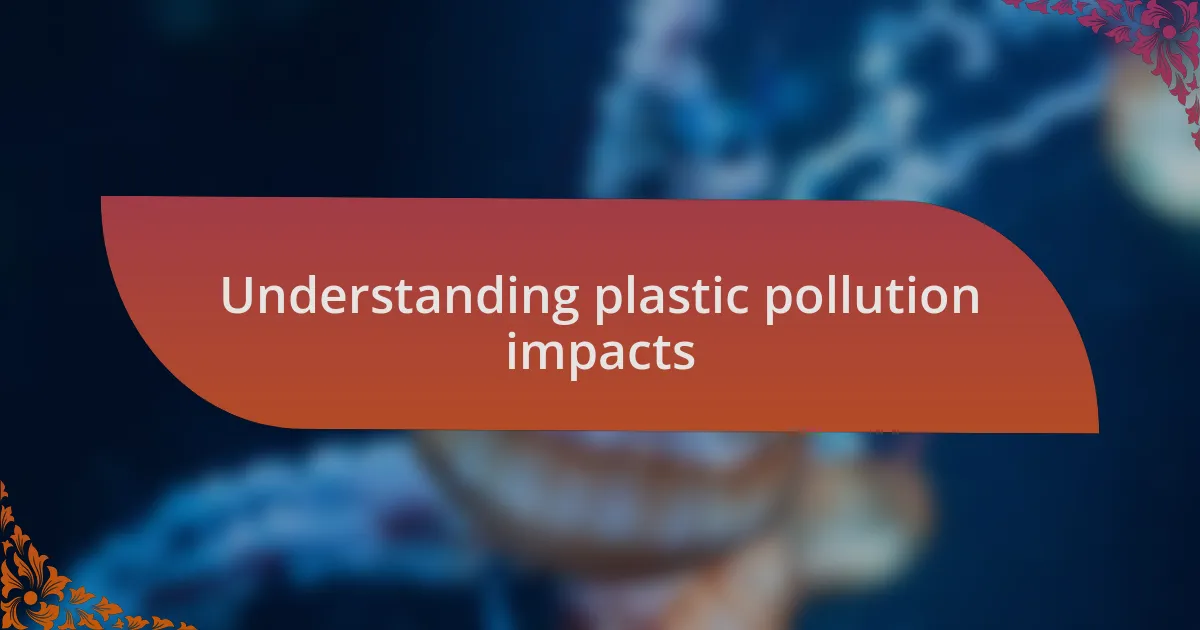
Understanding plastic pollution impacts
Plastic pollution is not just a distant problem; it’s a daily reality that affects all of us. I remember a beach trip where I was excited to feel the warm sand but was disheartened by the sight of plastic bottles strewn across the shore. As I picked them up, I couldn’t help but wonder: how did we let this happen?
The staggering reality is that millions of tons of plastic enter our oceans each year, choking marine life and disrupting entire ecosystems. One day, while snorkeling, I came face-to-face with a sea turtle entangled in plastic debris. It struck me hard; this gentle creature was a victim of our neglect. Are we truly aware of the consequences our choices have on these innocent beings?
Plastic influences not only marine health but human health as well, as microplastics infiltrate our food chain. I often think about the seafood I enjoy and how it might be laden with unseen threats. Could my appreciation for a meal be contributing to a larger problem? The thought is unsettling, but it’s a crucial reminder that our actions ripple through the ocean and back to us.
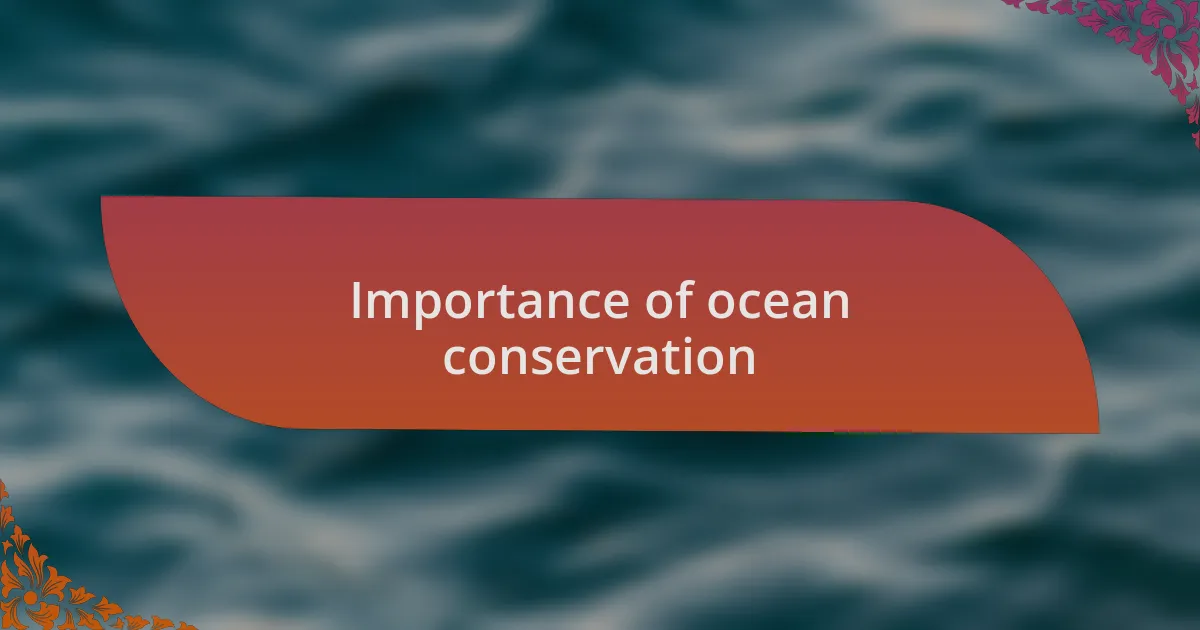
Importance of ocean conservation
Ocean conservation is vital not just for marine life; it’s essential for our own well-being. I often find solace by the water, reflecting on how vibrant marine ecosystems support the very air we breathe. When I learned that healthy oceans produce over half of the Earth’s oxygen, I couldn’t shake the thought: what will happen if we fail to protect these crucial habitats?
The impacts of conservation extend beyond just the physical realm; they touch on cultural and emotional connections as well. I recall visiting a coastal town where the locals spoke passionately about their ancestral ties to the sea. They taught me that preserving the ocean is about safeguarding traditions and their way of life, making me reflect on how interconnected we all really are.
Furthermore, protecting our oceans means safeguarding biodiversity, which in turn supports resilient ecosystems. I have had moments in tidal pools where witnessing the intricate web of life made it clear: each organism plays a role in maintaining balance. Isn’t it our responsibility to ensure that future generations can experience the same wonder? The importance of ocean conservation lies not just in saving marine life but in preserving our shared future.
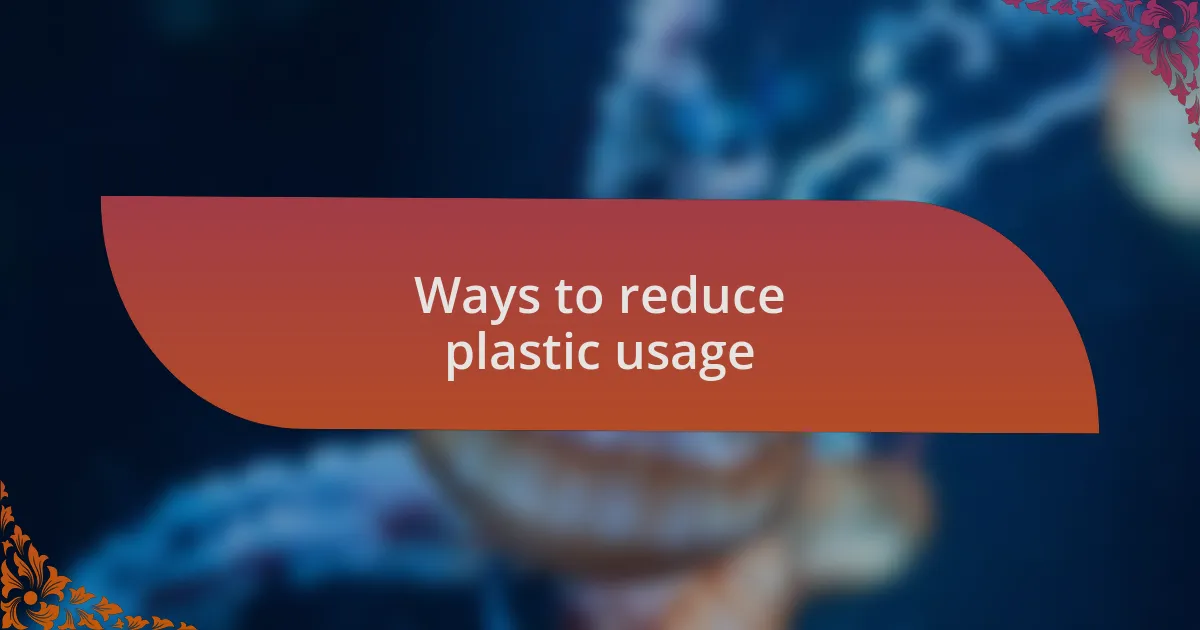
Ways to reduce plastic usage
One of the most impactful changes I’ve made is ditching single-use plastic bags. Instead, I invested in sturdy, reusable bags that I carry everywhere. I remember the first time I forgot my reusable bag at home and had to take a plastic one. It didn’t just feel like a small personal failure; it underscored the larger impact of our choices on the ocean.
Another strategy I adopted is reducing my consumption of bottled water. I replaced plastic bottles with a sleek reusable water bottle that I take with me all the time. I find that refilling my bottle not only decreases plastic waste but also reminds me to stay hydrated throughout the day. Have you ever considered how much easier it is when you have water readily available, minus the plastic?
Finally, I’ve become more mindful of the products I choose at the store. Whenever possible, I opt for items with minimal or no plastic packaging, favoring brands that prioritize eco-friendly materials. This change isn’t always easy, especially when faced with convenience, but I think about the sea turtles I once saw struggling with plastic. That image drives me to seek alternatives, reminding me how interconnected our choices truly are.
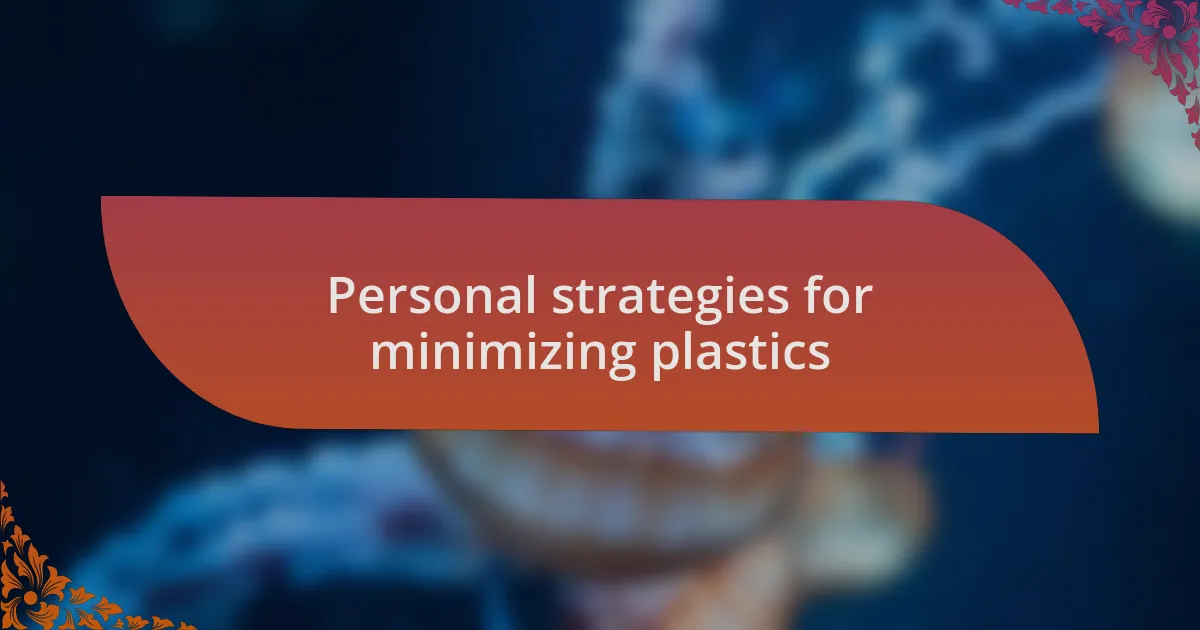
Personal strategies for minimizing plastics
One effective strategy I’ve implemented is switching to bar soaps instead of liquid soaps in plastic bottles. When I first made this change, I was surprised by how luxurious the lather felt and how much longer a bar lasts. It made me wonder, why had I ever opted for plastic packaging in the first place?
I’ve also started to bring my own containers when ordering takeout or leftovers. The first time I handed my container to the server, I felt a sense of pride. It was a small act, but it served as a tangible reminder of my commitment to reducing plastic waste. It makes me think: How many other simple habits can we adopt to reshape our relationship with convenience?
Additionally, I’ve been more creative with gifts, opting for experiences rather than items that come wrapped in plastic. Instead of giving a traditional gift, I’ve treated friends to nature hikes or cooking classes. This shift not only reduces the potential for plastic waste but also creates memories that last far longer than any physical object. Doesn’t it feel good to know that our choices can encourage others to rethink their own habits?
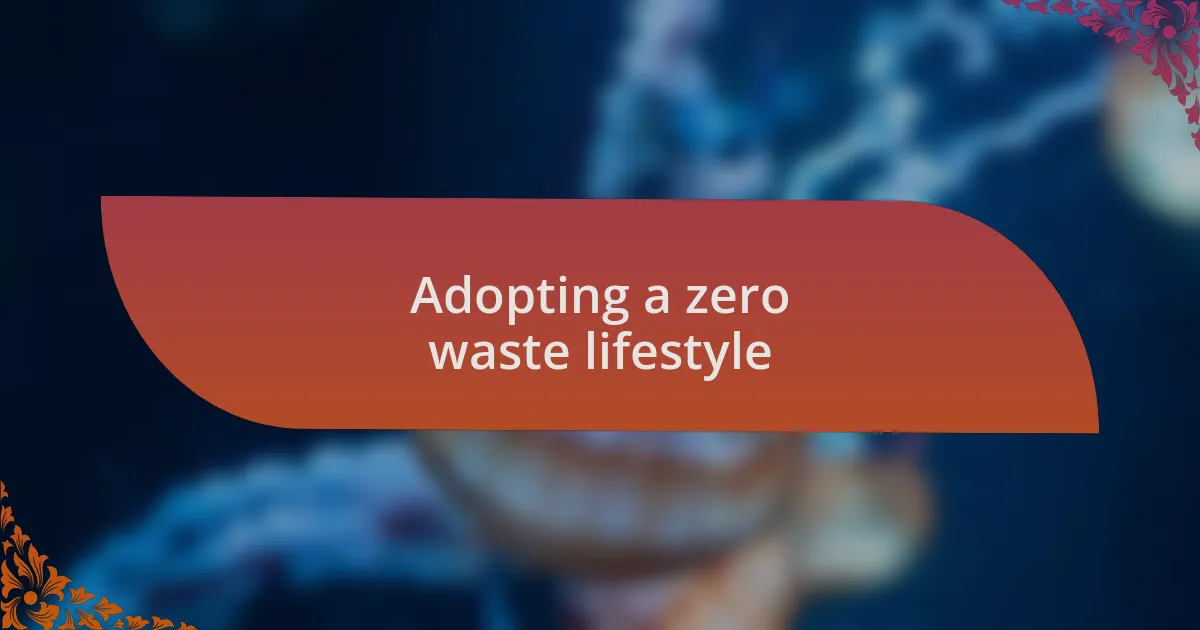
Adopting a zero waste lifestyle
Adopting a zero waste lifestyle has truly transformed my approach to daily living. Once, I found myself mindlessly collecting plastic bags every time I went shopping. Now, I carry my own reusable bags and feel a sort of empowerment every time I decline a single-use option. It’s fascinating how such a small change can evoke a deeper sense of responsibility towards our planet.
I remember the first time I tried a plastic-free grocery store. It felt liberating to fill my own jars with bulk items—grains, nuts, and spices—rather than relying on pre-packaged products. My heart swelled with a newfound joy as I realized that reducing waste wasn’t just about the planet; it was about reconnecting with the process of choosing my food. Do you ever get that warm buzz of excitement when doing something that aligns so closely with your values?
Incorporating composting into my routine has also been a game changer. At first, I was overwhelmed by the thought of managing scraps and waste, but it has grown into a rewarding habit. Watching my food waste transform into nutrient-rich soil made me appreciate the cycle of life more than I ever thought possible. Isn’t it incredible how embracing zero waste can deepen our connection to nature, reminding us of our role in something much bigger?
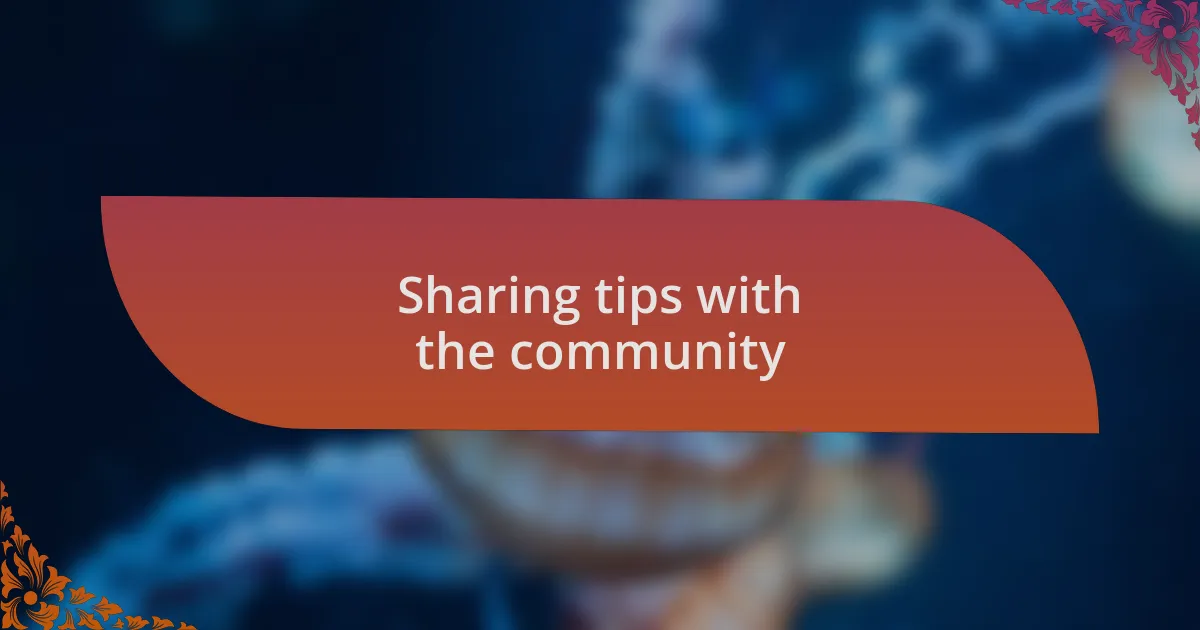
Sharing tips with the community
One of the best ways I’ve found to spread awareness about reducing plastic is by hosting local workshops. Just a few months ago, I gathered a small group of friends to discuss simple swaps, like using beeswax wrap instead of plastic wrap. Everyone left excited—not just about the knowledge, but also with a feeling of community, knowing we were all working towards the same goal. Have you ever experienced that thrill of sharing knowledge that can truly impact others?
I also love using social media to connect with a broader audience. I shared my journey through a series of posts, detailing the challenges and successes I faced while minimizing plastic use. The response has been heartwarming, with many people reaching out to share their own tips and experiences. Isn’t it amazing how a few shared stories can inspire a ripple effect, encouraging more people to make sustainable choices?
Additionally, I often participate in beach clean-up events, where I get to share tips in real-time with fellow volunteers. While picking up trash, I chat with others about alternatives to single-use plastic—like metal straws or biodegradable containers. These moments not only create lasting connections but also instill a sense of collective responsibility. Have you felt that sense of unity when working alongside others towards a common purpose? It’s truly empowering.
![]()
Tracking progress and celebrating success
Tracking my progress in reducing plastic has been a rewarding journey. I started keeping a journal, noting each small victory—like switching to a reusable water bottle or making my own cleaning products. Each entry became a celebration, a reminder that every little change counts. Have you ever paused to appreciate your own milestones along the way?
Sharing these moments of success with others has deepened my commitment. When I posted about finally ditching plastic bags for reusable ones, the responses poured in. Friends expressed their own wins and asked for advice, which felt like building a supportive network. I found great joy in realizing that my simple act inspired others to share their accomplishments too. It’s incredible how our shared journeys can fuel each other’s motivation, isn’t it?
I’ve also begun incorporating monthly reflections into my routine. This not only tracks my plastic reduction but allows me to celebrate the successes, no matter how minor they may seem. I’ve noticed that reflecting on these wins boosts my determination and reminds me why I started this journey in the first place. What victories have you celebrated that keep you driving forward?